Politics
Misplaced Priorities: How Casteist Link To Dosa And Idli Took Priority Over Beheading Of Girl In Tamil Nadu
Aravindan Neelakandan
Nov 02, 2018, 03:49 PM | Updated 03:49 PM IST
Save & read from anywhere!
Bookmark stories for easy access on any device or the Swarajya app.
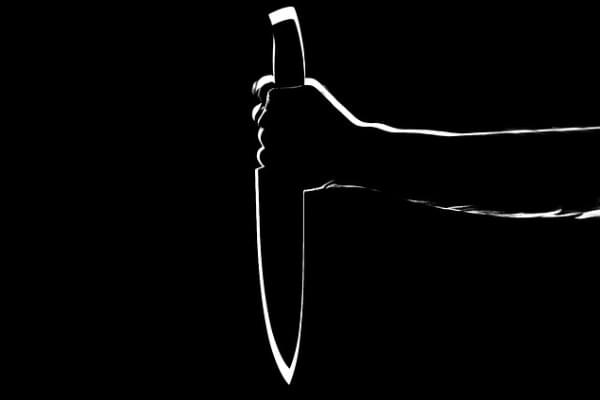

In the last week of October two incidents took place in Tamil Nadu – one shameful and inhuman and the other ridiculous and humiliating. In a small village of the Salem district, a 13-year-old Scheduled Caste girl was decapitated in a gruesome manner. Earlier, the killer had made advances to the girl, who rejected them. The killer Dinesh Kumar entered the girl’s house, where she lived with her labourer parents, severed her head with a sickle and walked away with the head, and later threw it away. A section of the media started spreading the story that the man was actually mentally disturbed, a story which the police had categorically rejected.

This shocking incident should have made every Tamil hang his or her head in shame, and start to introspect. Instead, in a bizarre case of misplaced priority, what went viral was a ridiculous video of Dravidianist ‘intellectual’ Mathimaran, who claimed that the thinner the dosa the more ‘Brahminical’ and ‘upper caste’ texture it acquired, while the thicker the dosa the more subaltern it got. While there was all-around criticism of the video, there was also a strong 'scholarly’ defence of the video. Mathimaran subsequently extended the theory to idli as well. The aim is to say that the Brahminical alien culture is dominating and corrupting the original, pure Dravidian non-Brahmin culture.
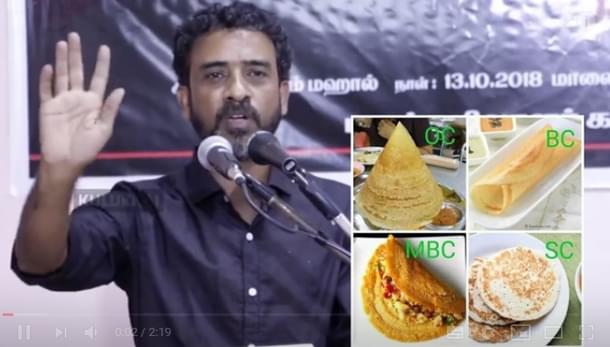
It is such narrow hate-filled binaries which have made social justice a ridiculous political circus. The considerably influential sections of the media, academia and the polity have internalised the Brahmin-non-Brahmin divide as axiomatic to their worldview. Thus the inhuman killer from the local dominant caste has been reported as ‘caste Hindu’. It is not even ‘caste Tamil’ or ‘caste Dravidian’, but always ‘caste Hindu’. More importantly, it is never about the specific caste group to which the offender belongs.
Tamils and Hindus definitely cannot exonerate themselves from the shame the gruesome and inhuman killing of Rajalakshmi has brought, as this is not what Tamil culture and, hence, Hindu values taught them. Chennai’s Kapaleeswarar Temple, temple tower (gopuram) has a depiction of Lord Shiva approaching a fire ritual (homa) conducted by Brahmins as an ‘untouchable’. The Brahmins who slighted him were punished according to the tradition. In other words, the temple tower declares untouchability as a sin. If we have not taken this message to the masses only because our secularism prevents us, is not our secularism an accomplice in the prevalence of untouchability in the society?
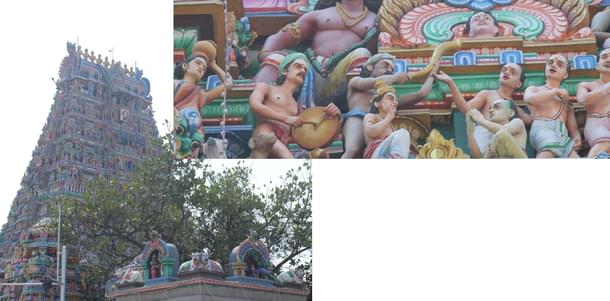
Untouchability and caste violence are the result of social stagnation during the sieges, invasions and subsequently colonialism. During this time both the colonialists as well as the vested interests in Indian society wanted to project abusive and exploitative relations between castes as an integral part of the religion. The vested interests within Indian society were happy because it assured their own position and well-being. The British were happy because they could tear away a vast section of Indian people from the mainstream identity and make them feel ‘safe’ and indebted to the British Raj. Besides, the British could play the game of ‘civilising’ mission.
Indian savants and freedom fighters saw through this game. Dayananda Saraswathi, Swami Vivekananda, Swami Sahajananda and Sri Narayana Guru used Hindu Vedanta to fight against this tendency. The national bard Subramaniya Bharathi of Tamil Nadu condemned caste distinctions and emotionally sang to the children:
Castes exist not my child
Sin it is to call one high born and low
Those filled to the brim with justice,
wisdom, education and love
they alone are noble;
Dravidianists like Mathimaran supported by radical left categorise Bharathi, the face of social and women emancipation movement, as ‘Hindutvaite’ and ‘Brahminical’. But the songs of Bharathi brought about a change in the value system of the Tamil society - a veritable renaissance based on Vedantic humanism. The problem with Dravidianists is exactly that. They want the social evils to exist so that they can denigrate Hinduism and a particular community. This has led to a situation where the Dravidianists can be called ‘rank casteists’ and who still utter ‘progressive’ slogans in the public.
An example of such duplicity is Pazha. Karuppaiah is a veteran of chameleon politics who joined almost all political parties before ending up with the Dravida Munnetra Kazhagam (DMK). His rhetorical rants are abuses against Hinduism, which are a hit among the Dravidianists. In the same breath, he called for the excommunication of a couple in his community who opted for an inter-caste marriage, displaying such shameless double standards of Dravidian movements starting with E V Ramasamy (EVR) himself, and hence it is a fundamental flaw. But instead of addressing serious issues such as the killing of the young girl, the Dravidianists and their company of foolish men, analyse how the thickness of dosa is inversely proportional to caste status.
There is nothing more fraudulent than the term ‘caste Hindu’ with respect to the atrocities against the Scheduled communities and tribes. This nomenclature which is essentially colonial is aimed at essentialising Hinduism as ‘nothing but caste’. This has facilitated conversions. At the ground level, this term has helped the dominant castes who engage in atrocities and then blame Hinduism to escape the shame and regret. At the political level, it has helped the vote-bank managers to keep the fault lines alive and help keep their vote banks intact. For the leftist section academia and evangelical forces as well as the old media, it helps to blame Hinduism for all the evils of the Indian society, and facilitate conversions. So, for the average SC citizen in the country, the idea that 'Hinduism is responsible for caste‘ becomes an integral part of its worldview.
But is this true?
In 1981, the nation was shocked when a village in Tamil Nadu converted to Islam. The villagers belonged to a Scheduled community and they attributed their conversion to the atrocities of ‘caste Hindus’ - a particular Other Backward Class (OBC) community. This was projected in the national media. The characterisation of the particular locally dominant OBC community as 'caste Hindus’ and hence implying their discriminatory actions as being sanctioned by Hinduism somehow, was not challenged then just as it is not challenged now. Had anyone taken care to probe the problem properly then, they would have found out that the same SC community, which was being harassed by a dominant community in one village, was being honoured in the famous South Indian Shiva temple in the form of an elderly couple, who is revered by the so-called ‘Brahminical’ traditions as Shiva and Parvathi. The community has the presiding right in conducting the ritual. So the question that should be raised over the harassment of SC community by the dominant community, and the conflicts they have with them, is indeed the impact of Hinduism or the local politico-social developments starting from the colonial era of ‘divide and rule’ to the Dravidian era of vote-bank politics.
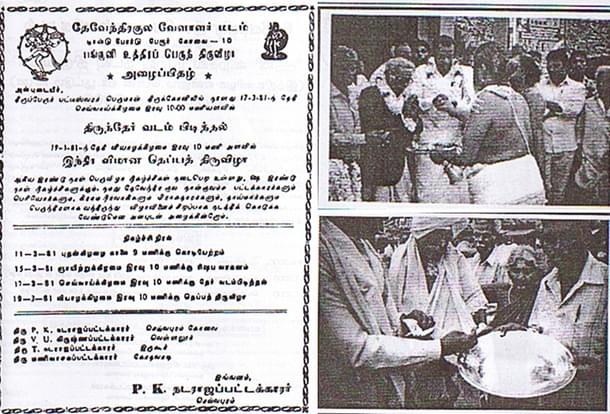
Today Devendrakula Vellalars are appealing to be taken off the Scheduled community list. Incidentally, this is actually the result envisioned by Dr Ambedkar. Rejecting religion as the basis for defining minorities and majorities, he wanted social backwardness to be the sole criterion for defining minorities and then proceeded to point out that while it is wrong for the majority to deny the existence of the minorities it is equally wrong for the minorities to perpetuate themselves. However, the perversion of pseudo-secular polity made reservations into a political weapon thus making every community fight for reservation through a ‘competitive victimhood’ narration.
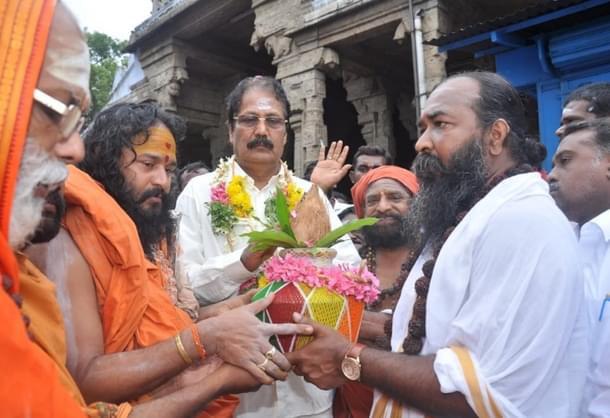
The result is the fierce anger towards the perceived ‘other’ which often took into account the narrative of Aryan and non-Aryan. Thus, every community imagined itself as the autochthonous ruler who was cheated by the reservation-hungry community which in turn was seen as the ethnic or linguistic other. These identities were reinforced by quasi-scholarships, movies and political narratives. When these dangerous cocktail combines with the real socio-economic disparities, then we have people committing inhuman acts like the decaptating of the young girl.
Today, the Scheduled communities are realising that they were not downtrodden nor do they have to reject their cultural heritage in order to empower themselves to fight the discrimination heaped on them by the others. Even Thirumavallavan, the ideological mercenary nurtured by ‘Breaking India’ forces to malign Hinduism, finds himself performing the so-called ‘Brahminical’ ritual in his own home village temple.
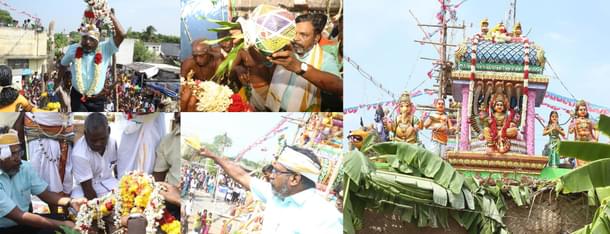
One hopes that the leader does have the honesty and bravery to look into this aspect of Hinduism and integrate it into his own political discourse. If not, then the cognitive dissonance may force him to further invent another sordid convoluted reasoning like an imagined Buddhist past appropriated by ‘Brahminical forces’ etc. This again would create more alienation and more cognitive dissonance which in turn would push the communities into a downward spiral.
Meanwhile oblivious to all these intricate dynamics through which the society moves, and the ability of dharma to free the society from the mental disease of casteism, injudicious Dravidianism, as represented by Mathimaran, indulges in the perverted self-pleasure of further spreading ridiculous falsehoods like “eating off plantain leaves is Brahminical while eating in plates is subaltern and egalitarian”
Rajalakshmi’a killing shows that unless and otherwise we use every element of dharma that harmonises the depraved relationships between the communities, vitiated through alien invasions, continuous sieges and colonial interventions not to mention ‘the perverted political parlance’ of pseudo-secularism, we will suffer more of such crimes with some graduating to hate crimes. And there will be no section of the society that will be immune from being the either the perpetrator or victim of such crimes. The self-flagellation by Hindus has now become a profitable political cottage industry ultimately creating monstrous travesties like Mathimaran, Agnivesh and Kancha Illayah. Their contribution to social justice is zilch and negative. They are more an impediment to battling our social evils, bringing in social justice and ushering in social harmony.
So what is needed right now is to exhort the community leaders to look into the spiritual bonds that bind the diverse communities - both intra-community as well as inter-communities and strengthen these bonds so that the hatred and injustice completely disappear from the social life. Social justice and social harmony should be the ultimate fruit of dharma in our public life. We have all the needed cultural and spiritual tools to fashion such a society but we have thrown the very tools labelling them as casteist and then have embraced a discourse of hate that is neither true to our real self and lived experience nor true to history.
So on a war footing, we need to course-correct and rectify the alarming situation. This society cannot afford crimes where children of any community are sexually abused and decapitated. The thought that the victim or the monster who committed the crime could be our own, should fill us with agony and shame. That realisation along with agony and shame is also very importantly an integral part of Hindutva as much as the Kumbabhishekam in Angannur goddess temple and the paddy sowing festival in the Patteeswarar Shiva temple in Coimbatore.
Aravindan is a contributing editor at Swarajya.




